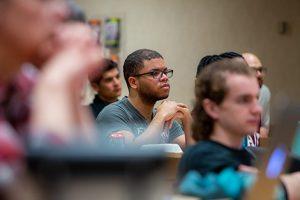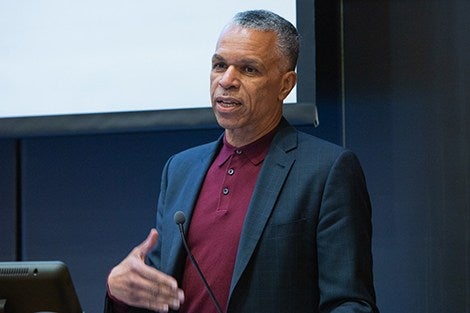April 30, 2019—In a video, a young African American man named David narrates the story of his life over a series of portraits and images of his Philadelphia neighborhood. He describes the trauma of watching loved ones die from gun violence, and the fear that he would be next. In photos, he adopts a protective posture, hunched over to save his brain and heart.
John Rich, MPH ’90, told the audience at Harvard T.H. Chan School of Public Health’s Yerby Diversity Lecture in Public Health, held April 18, 2019 in Kresge G-3, that he chose to begin his talk with David’s story to bring a human face and voice to the gun violence statistics that would follow, and to demonstrate how trauma can become “imprinted under the skin.”
Each year, the Yerby lecture brings minority scientists and scholars to the Harvard Chan School to speak on important health topics. It was named for the late Alonzo Smythe Yerby, MPH ’48, an African American pioneer in public health who from 1966–1975 was chair of the School’s former Department of Health Services Administration (forerunner to the Department of Health Policy and Management).
This year’s lecture was introduced by Dean Michelle Williams, who said that it was a pleasure to welcome home an alum of the School who is a “truly tremendous scholar.” Rich, a physician, is the author of the book Wrong Place, Wrong Time: Trauma and Violence in the Lives of Young Black Men and the recipient of a MacArthur Foundation “Genius” Fellowship.
David was a participant in a program Rich founded called Healing Hurt People. Sponsored by the Center for Nonviolence and Social Justice at Drexel University School of Public Health—where Rich is a professor and chair of the Department of Health Management and Policy—the program works with young men of color who come to area emergency departments for gunshot or other assault wounds. With the help of peer health workers, it provides participants with counseling and training. The goal is to foster their healing from emotional wounds and post-traumatic stress disorder, and to help them start to rewrite the stories of their lives in more hopeful directions.
The cycle of trauma

Rich told the audience that he experienced a major turning point in his thinking early in his career when he was a physician at Boston City Hospital. He started looking into the reasons why many young black men treated in the emergency room for gunshots get shot again. He used to believe that “people don’t just get shot, they get themselves shot,” he said. But after talking to more young people about their lives, he began to change his views.
Research shows that 44% of people who are shot or stabbed will receive similar injuries within five years, Rich said, and 20% of them will die. Substance abuse was a factor in 70% of these deaths. To Rich, this suggests that they “succumbed to the accumulated trauma in their lives.”
He explained how this trauma becomes a cycle: Young people of color in communities where violence is prevalent can develop post-traumatic stress disorder from events they have experienced or witnessed. Many lack access to the health care system, so they self-medicate with alcohol or drugs. This can impair their ability to get a job, so they fall into illicit activities. They don’t trust the police to protect them, so they carry a gun. This can lead them into violent interactions and, ultimately, to incarceration or death. And throughout their lives, racism amplifies the lack of opportunities they face.
The Healing Hurt People program focuses on things like helping young men manage their emotions and find employment and other opportunities to better their lives. The program has shown some success, particularly around helping participants decrease stress and depression and improve sleep, Rich said. But there is still more work to be done to address deeper levels of trauma.
He said that part of the challenge is to help foster a cultural shift in thinking about young people—to stop seeing them as “a problem, rather than our most important resource.”
Photos: Lisa Abitbol
